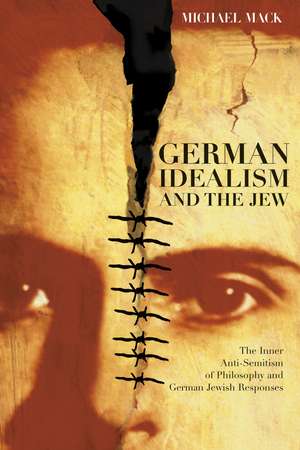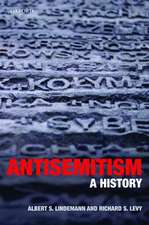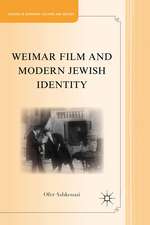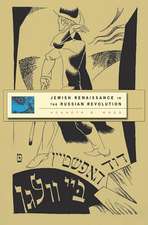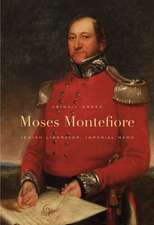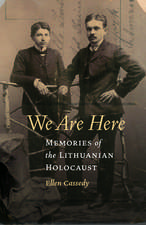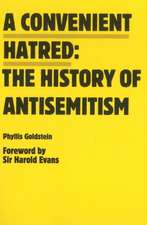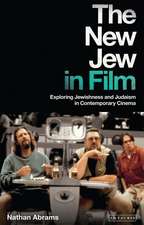German Idealism and the Jew: The Inner Anti-Semitism of Philosophy and German Jewish Responses
Autor Michael Macken Limba Engleză Paperback – 17 oct 2013
In German Idealism and the Jew, Michael Mack uncovers the deep roots of anti-Semitism in the German philosophical tradition. While many have read German anti-Semitism as a reaction against Enlightenment philosophy, Mack instead contends that the redefinition of the Jews as irrational, oriental Others forms the very cornerstone of German idealism, including Kant's conception of universal reason.
Offering the first analytical account of the connection between anti-Semitism and philosophy, Mack begins his exploration by showing how the fundamental thinkers in the German idealist tradition—Kant, Hegel, and, through them, Feuerbach and Wagner—argued that the human world should perform and enact the promises held out by a conception of an otherworldly heaven. But their respective philosophies all ran aground on the belief that the worldly proved incapable of transforming itself into this otherworldly ideal. To reconcile this incommensurability, Mack argues, philosophers created a construction of Jews as symbolic of the "worldliness" that hindered the development of a body politic and that served as a foil to Kantian autonomy and rationality.
In the second part, Mack examines how Moses Mendelssohn, Heinrich Heine, Franz Rosenzweig, and Freud, among others, grappled with being both German and Jewish. Each thinker accepted the philosophies of Kant and Hegel, in varying degrees, while simultaneously critiquing anti-Semitism in order to develop the modern Jewish notion of what it meant to be enlightened—a concept that differed substantially from that of Kant, Hegel, Feuerbach, and Wagner. By speaking the unspoken in German philosophy, this book profoundly reshapes our understanding of it.
Offering the first analytical account of the connection between anti-Semitism and philosophy, Mack begins his exploration by showing how the fundamental thinkers in the German idealist tradition—Kant, Hegel, and, through them, Feuerbach and Wagner—argued that the human world should perform and enact the promises held out by a conception of an otherworldly heaven. But their respective philosophies all ran aground on the belief that the worldly proved incapable of transforming itself into this otherworldly ideal. To reconcile this incommensurability, Mack argues, philosophers created a construction of Jews as symbolic of the "worldliness" that hindered the development of a body politic and that served as a foil to Kantian autonomy and rationality.
In the second part, Mack examines how Moses Mendelssohn, Heinrich Heine, Franz Rosenzweig, and Freud, among others, grappled with being both German and Jewish. Each thinker accepted the philosophies of Kant and Hegel, in varying degrees, while simultaneously critiquing anti-Semitism in order to develop the modern Jewish notion of what it meant to be enlightened—a concept that differed substantially from that of Kant, Hegel, Feuerbach, and Wagner. By speaking the unspoken in German philosophy, this book profoundly reshapes our understanding of it.
Preț: 243.17 lei
Nou
Puncte Express: 365
Preț estimativ în valută:
46.53€ • 48.71$ • 38.50£
46.53€ • 48.71$ • 38.50£
Carte tipărită la comandă
Livrare economică 07-21 aprilie
Preluare comenzi: 021 569.72.76
Specificații
ISBN-13: 9780226500966
ISBN-10: 0226500969
Pagini: 237
Dimensiuni: 152 x 229 x 16 mm
Greutate: 0.34 kg
Editura: University of Chicago Press
Colecția University of Chicago Press
ISBN-10: 0226500969
Pagini: 237
Dimensiuni: 152 x 229 x 16 mm
Greutate: 0.34 kg
Editura: University of Chicago Press
Colecția University of Chicago Press
Notă biografică
Michael Mack is a Minerva Amos de Shalit fellow at the Franz Rosenzweig Research Center for German Jewish Literature and Cultural History at Hebrew University of Jerusalem. He is the author of many books, most recently Spinoza and the Specters of Modernity and How Literature Changes the Way We Think.
Cuprins
Acknowledgments
Introduction: The Political, Philosophical, Theological, Sociological, and Literary Critical Ramifications of Anti-Semitism
Part One: Narratives
1 Positing Immutability in Religion: Kant
2 The Metaphysics of Eating: Jewish Dietary Laws and Hegel's Social Theory
3 Transforming the Body into the Body Politic: Wagner and the Trajectory of German Idealism
Part Two: Counternarratives
4 Moses Mendelssohn's Other Enlightenment and German Jewish Counterhistories in the Work of Heinrich Heine and Abraham Geiger
5 Political Anti-Semitism and Its German Jewish Responses at the End of the Nineteenth Century: Heinrich Graetz and Otto Weininger
6 Between Mendelssohn and Kant: Hermann Cohen's Dual Account of Reason
7 Franz Rosenzweig, or The Body's Independence from the Body Politic
8 The Politics of Blood: Rosenzweig and Hegel
9 Freud's Other Enlightenment: Turning the Tables on Kant
10 Walter Benjamin's Transcendental Messianism, or The Immanent Transformation of the Profane
Conclusion: Elias Canetti, Franz Baermann Steiner, and Weimar's Aftermath
Notes
Index
Introduction: The Political, Philosophical, Theological, Sociological, and Literary Critical Ramifications of Anti-Semitism
Part One: Narratives
1 Positing Immutability in Religion: Kant
2 The Metaphysics of Eating: Jewish Dietary Laws and Hegel's Social Theory
3 Transforming the Body into the Body Politic: Wagner and the Trajectory of German Idealism
Part Two: Counternarratives
4 Moses Mendelssohn's Other Enlightenment and German Jewish Counterhistories in the Work of Heinrich Heine and Abraham Geiger
5 Political Anti-Semitism and Its German Jewish Responses at the End of the Nineteenth Century: Heinrich Graetz and Otto Weininger
6 Between Mendelssohn and Kant: Hermann Cohen's Dual Account of Reason
7 Franz Rosenzweig, or The Body's Independence from the Body Politic
8 The Politics of Blood: Rosenzweig and Hegel
9 Freud's Other Enlightenment: Turning the Tables on Kant
10 Walter Benjamin's Transcendental Messianism, or The Immanent Transformation of the Profane
Conclusion: Elias Canetti, Franz Baermann Steiner, and Weimar's Aftermath
Notes
Index
Recenzii
"Michael Mack's German Idealism and the Jew fills a grave void in philosophy's self-critical scholarship. Mack seeks to clarify how the German Idealist philosophical tradition directly served toward the burgeoning of a new, more dangerous anti-Semitism that, under the blank eye of 'civilized' nations and with the blessing of the Christian churches, resulted in the methodical slaughter of millions upon millions of European Jews. . . . German Idealism and the Jew is a work long overdue, of great importance to scholarly understandings of Nazi Germany and anti-Semitism and the larger problem of the functioning of the scapegoat mechanism in chaotic societies."
"A slim but dense volume which is sure to delight and provoke in equal measure."
"Mack elucidates the antisemitic strains in the German idealistic presentation of the body, the body politic, legality, and revolutionism. Furthermore, Mack makes a strong case that nineteenth-century German Jews recognized and revised these caricatures of Jews and Judaism as best they could, anticipating a postmodern sense of human autonomy and responsible rationalism."
“Mack’s argument is subtle and wide-ranging, but his major points can be roughly summarized. First, he shows how deeply indebted German idealism was to the language of Christianity: In Kant and Hegel, the Jews keep their old role as the stiff-necked people, those who perversely refuse to see the light. Second, he makes clear how frighteningly ready these thinkers were to turn Jews—individual human beings, with their own minds and beliefs, virtues, and vices—into ‘the Jews,’ a placeholder in a philosophical system.”
“This is the most lucid and penetrating effort yet to characterize the leading philosophers of the German idealist tradition as central figures in the history of modern antisemitism.”
“A major addition to the critical literature of German Jewry from the Enlightenment to the Shoah. Mack’s extraordinary study of the philosophical underpinnings of German anti-Semitism from Kant to Hegel picks up a thread of intellectual corruption that formed major Jewish thinkers from Rosenzweig and Benjamin and beyond. Focused on a thought which today still shapes modern philosophical discourse, Mack offers a sense of the productive deformation of German Jewish thought through its struggle with German philosophy.”<Sander L. Gilman, University of Illinois, Chicago
“The custodians of the German Enlightenment and philosophical culture nursed deeply ambivalent attitudes toward the Jews whom they formally invited to join them in the project of creating modern open and tolerant culture. Michael Mack revisits their writings and deftly discloses the deeper structure of their thought encouraging the construction of the Jew as a threatening Other. Mack argues that modern Jewish thinkers, from Moses Mendelssohn through Walter Benjamin and Freud intuitively grasped that at the heart of the modern votaries’ understanding of reason lies ‘unreason.’ Critically reflecting upon the dialectic tension between these two constitutive moments of the modern thought, Mack claims, German-Jewish writers anticipated a post-modern sensibility, endowing what it means to be an enlightened, autonomous person with a new depth.”<Paul Mendes-Flohr, University of Chicago
"Mack makes a significant and innovative contribution to two heavily traversed fields: the causes of the Shoah, and the ambiguous legacy of philosophical modernity."
